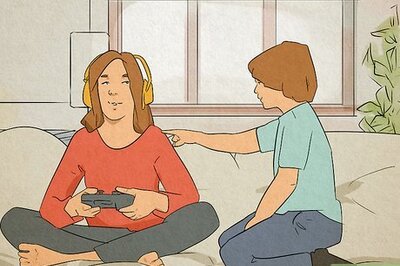
views
Many people often find themselves in unhealthy relationships because of a simple mistake. They fail to impose healthy boundaries. This mistake often extends to their family members. Healthy boundaries are the limits you place around yourself. This includes protecting your time, emotions, body, and mental health. Healthy boundaries can help you stay resilient and content with who you are. Recently, a marriage and family therapist, Emily H. Sanders shared what healthy boundaries look like in a home.
Sanders shared an Instagram carousel of 7 characteristics of a home with healthy boundaries. In her caption she mentioned, “This kind of environment promotes respectful relationships with self and others.” In case you are wondering what these 7 characteristics are, read on to find more:
Respect For Privacy
Just because someone lives under the same roof and shares a bloodline, does not give them the automatic right to be privy to all that is going on with someone. Privacy includes emotional and physical space. No one should be pushed to share anything beyond the limit with which they are comfortable.
Clear Limitations Established
Parents should clearly establish and communicate what sails in the house and what does not. These home rules should be reasonable and regularly imposed. Children left to guess for themselves what is allowed and what is not is never the right idea. Clear communication makes it easy for a child to follow through.
Familial Structure
According to Emily Sanders, this characteristic is crucial for safety purposes. A familial structure goes beyond the power hierarchy where the parent lets it known they are in charge. It can also look like a structure about physical time, like bedtime and meal times, as well as a structure about physical space.
Bodily Autonomy Respected
Anything that is not a “yes” is automatically a “no”. Even among family members that are to be understood and respected. There should never be unwanted bodily contact. This is a crucial boundary to enforce even on young kids. It teaches them to respect other people’s consent and know that their consent matters too.
Parents Not Reliant On Children
A child is not a friend, therapist, or partner. They should be treated like offspring. Parents must never discuss or burden their children with their issues. It is better to seek appropriate support and enable themselves to care for a child in the way they should be cared for.
Safe To Seek Help And Comfort
If a child is fearful to seek help or comfort from their parents, that is never a good sign. Children are not apt to care for themselves and should not be left to their own devices for it either. A healthy household is where a child feels comfortable coming to their parents in times of distress.
Age Appropriate Decisions Encouraged
At the end of the day, everyone is responsible for their choices. Including children. They should be given the space to make age-appropriate decisions for themselves. This can help a child understand the meaning of autonomy and independence.
Read all the Latest Lifestyle News here



















Comments
0 comment